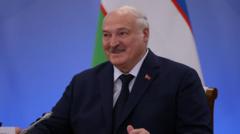Alexander Lukashenko's re-election under shadowy circumstances raises concerns over democratic integrity in Belarus.
Lukashenko Claims Mandate in Controversial Election Amid Stiff Opposition Repression

Lukashenko Claims Mandate in Controversial Election Amid Stiff Opposition Repression
Belarusian leader's election win criticized globally as a farce by Western nations.
The authoritarian grip of Belarusian President Alexander Lukashenko continues as he claims a sweeping victory in an election deemed a charade by many international observers. The Central Election Committee announced on Monday that Lukashenko captured 86.8% of the vote with an almost 87% turnout rate.
Critics point out the farcical nature of the election, which permitted four names on the ballot that were pre-selected to pose no real threat to the regime. Notably, independent candidates were overlooked, as opposition leaders are largely imprisoned or living in exile. Without any independent monitors present, the transparency of the vote was further called into question.
European officials responded vehemently, with EU foreign policy chief Kaja Kallas calling the election a "blatant affront to democracy." Similarly, German Foreign Minister Annalena Baerbock remarked on social media that "the people of Belarus had no choice" in the apparent election process.
In sharp contrast, Kremlin spokesperson Dmitry Peskov characterized the election as "absolutely legitimate, well-organized, and transparent," reflecting the sentiments of Russian President Vladimir Putin, who congratulated his ally Lukashenko. Leaders from China, Venezuela, and Pakistan also expressed their support for the Belarusian leader following his announced victory.
Opposition figurehead Svetlana Tikhanovskaya, who claimed victory in the contested 2020 election, dismissed the latest election as another instance of "political farce." She remained a critique against Lukashenko's regime, asserting that he underestimated her popularity during the last election. Likewise, her absence underlines the current lack of dissenting voices within Belarus, which has effectively dismantled independent media outlets.
In an interview with the BBC, Lukashenko remained defiant against criticism, asserting that his political adversaries have opted for either imprisonment or exile, emphasizing his disregard for Western recognition of the election's validity. With this recent election, Lukashenko secures his seventh term since 1994, reinforcing a longstanding authoritarian regime in Belarus.
Critics point out the farcical nature of the election, which permitted four names on the ballot that were pre-selected to pose no real threat to the regime. Notably, independent candidates were overlooked, as opposition leaders are largely imprisoned or living in exile. Without any independent monitors present, the transparency of the vote was further called into question.
European officials responded vehemently, with EU foreign policy chief Kaja Kallas calling the election a "blatant affront to democracy." Similarly, German Foreign Minister Annalena Baerbock remarked on social media that "the people of Belarus had no choice" in the apparent election process.
In sharp contrast, Kremlin spokesperson Dmitry Peskov characterized the election as "absolutely legitimate, well-organized, and transparent," reflecting the sentiments of Russian President Vladimir Putin, who congratulated his ally Lukashenko. Leaders from China, Venezuela, and Pakistan also expressed their support for the Belarusian leader following his announced victory.
Opposition figurehead Svetlana Tikhanovskaya, who claimed victory in the contested 2020 election, dismissed the latest election as another instance of "political farce." She remained a critique against Lukashenko's regime, asserting that he underestimated her popularity during the last election. Likewise, her absence underlines the current lack of dissenting voices within Belarus, which has effectively dismantled independent media outlets.
In an interview with the BBC, Lukashenko remained defiant against criticism, asserting that his political adversaries have opted for either imprisonment or exile, emphasizing his disregard for Western recognition of the election's validity. With this recent election, Lukashenko secures his seventh term since 1994, reinforcing a longstanding authoritarian regime in Belarus.



















